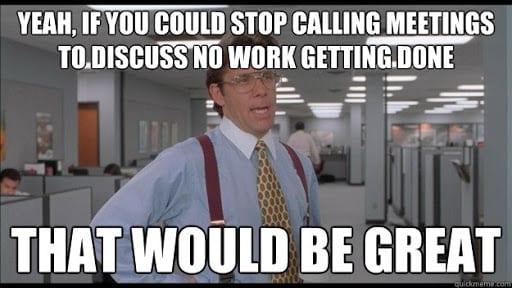
We’ve all seen the funny memes and heard the classic quotes about the OFFICE MEETING.
- “A meeting is an event where the minutes are kept and the hours are lost.” -Unknown
- “We are going to continue having these meetings, everyday, until I found out why no work is getting done.” -Richard Moran
- “The least productive people are usually the ones who are most in favor of having meetings.” -Thomas Sowell
Despite their bad reputation, I LOVE team meetings. Although, I would venture to say I’m a productive person, and the meetings I call are certainly not a waste of time.
So, let me amend my statement: I LOVE meaningful team meetings.
Especially right now, in the midst of COVID-19, team meetings are crucial to the success of our staff members who often have varying schedules. Your team members, or the mix of team members, could be different every day!
Despite COVID-19, many veterinary hospitals are busier than ever before. If you’re not dedicating a specific time to convene and communicate with everyone on your team as a whole unit, you are missing out on the opportunity to build team morale and pass along important information from shift to shift.
Here are a few key points about having consistent and meaningful team meetings:
Pick a Day and Time and Frequency…. Stick to It!
In my hospital, we met once a week for one hour, every Monday. Every team member was required to attend, and their schedule was built to accommodate that.
We didn’t see clients during this time slot, and the phones were set to voicemail. It may seem like an investment of time and money, but the rewards include:
- A more efficient and confident staff.
- Better customer service, which ultimately will help you retain clients.
- Delivering higher quality medical care.
These are ALL perks that will build your business and make it more profitable.
If you fail to prepare, you plan to fail.
It’s vital to spend time figuring out the content of each team meeting prior to that day. For example; all of my team meetings are centered around our core business values. We cover preventative care topics to better serve our patients, customer service (including reading reviews and celebrating successes), and team engagement and building. We make sure to review our financial performance, and always celebrate achievements as a team. Our team meetings are also an opportunity to relay important information and make sure everyone is on the same page. For example, if a certain medication is on backorder, and we are currently using a substitute, or if any safety procedures were changing.
If you don’t have an agenda, and you just “wing it”, your staff will be able to sense that, and the whole meeting will feel like a waste of their time. Within your agenda, leave some white space for the note takers to keep up, and for any questions or conversations that may arise. By prioritizing your talking points, you and your team will be more prepared to tackle what you want to achieve together that day!
Make it interactive!
As a young Practice Manager, I typically did all the talking. At the time, I felt I knew all the answers to our problems. I realized that I was struggling to get my team to engage in these solutions.
Eventually, I did minimal talking and let them brainstorm amongst themselves, talk through issues as a group, and watched as they either came to the same conclusion as me OR had an even better idea. When THEY were the ones deciding, they were more likely to execute their plan of action. I was simply there to guide the conversations, ask question, gather consensus, and document their commitment.
Let your team talk! You may be missing out on some wonderful ideas and strong voices. If education is involved, get your team involved with presentations, or play games with quizzing and prizes!
Call to Action
Whether we are working on group problem solving, changing processes in the hospital, or deciding on a new standard of care for our pets, we always had something to work on to continue BETTERING ourselves.
Keep track of your team’s commitments, and follow up on them within each meeting. Troubleshoot– what worked? What didn’t? Hold people accountable, and give new assignments towards your goals. Everyone should be leaving your team meetings with a task to complete in order to take action.
In conclusion…
I went from having a hospital with 100% turnover to less than 10%, and the reason for that was spending time together each week to work on skills that made us a better team.
When people complain about their work meetings, I have to wonder what their meetings look and sound like. If they don’t have all of the above characteristics, then they very well may be a waste of time and money for most folks. But, when executed well and effectively, they may end up being the most important hour of your week!

Chris Henning – Hippo Manager Practice Coach
Chris Henning has been in the veterinary field for over 10 years, her specialties including wellness plan implementation, change management, professional development, and customer service. She believes in providing the highest level of medical care to pets and clients, while developing teams to perform at their highest potential. Chris is passionate about helping other veterinary leaders expand their own leadership skills to increase their own team engagement and financial success.

Leave a Comment: